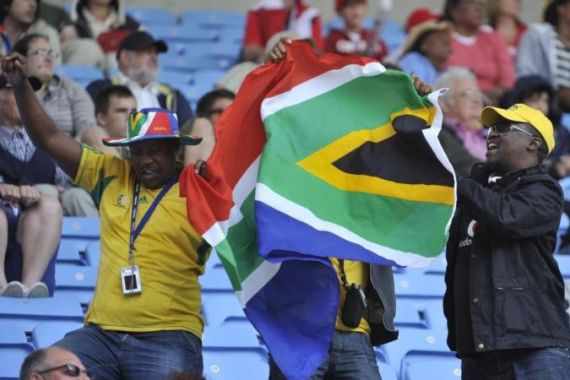Lessons from the Olympics
Global inequalities are on parade at the Olympic Games, but few want to discuss them.

Johannesberg, South Africa – There was a cartoon in South Africa’s Mail & Guardian this week by the great cartoonist Zapiro. While he’s known for controversial commentary, this one was probably widely embraced.
It had one panel split into two boxes. On one side, there was a scene from the ongoing treason trial of a violent white supremacist group called Boeremag, which stands accused of planning a violent coup to bring back apartheid. One of the accused is claiming that all whites are being mistreated.
In the other box, we see the Olympic awards platform with white South Africans winning gold medals for South Africa to be cheered on from people of all races.
Are there still racial grievances in this country? Of course, but the Olympics – televised in South Africa on seven channels – is bringing the country together, as the World Cup did two years ago. Sporting events can do that, at least for the moment in which the public is mesmerised, and all the media promoted patriotism detracts from their problems.
Every nation for itself
South Africans are not only sports-crazed, but are also desperate for international recognition. Every nation seems to be driven by the same frenzied desire to prove their worth by going for the Gold. That has a certain ironic echo in a country that was built on gold, and where each week workers die in still unsafe mines.
| Pistorious to race towards Olympic history |
While it is thrilling to watch track and field events, the focus is on who’s winning and what’s the score. TV commentators have nothing to say about the countries themselves. You don’t see graphics listing their GDPs, poverty rate, or whether or not their citizens have free expression or can vote – it’s only about the game.
When there’s a “blow out” of the Nigerian basketball team by US all-stars, no one explains how much money is spent on sports training in the US’ highly commercialised sport industry compared to what has been spent training Nigeria’s squad. All of these inequalities are on parade at the Olympic Games, but no one talks about them.
They also don’t talk about the hopes that drive many of these athletes to become stars worldwide, many of whom want to escape countries that are at war or trapped in poverty. They too want contracts to endorse products.
Watching the athletes winning events and drape themselves in their home country’s flag, you realise that these games just reinforce the worst and most superficial patriotism – but not a sense of global purpose or the need for global change.
An event that should promote internationalism as an ideal has become a platform for parochial nationalism of the most temporary kind, while none of the many parallel arts and culture events that are put on to create a global community are televised.
Learning from the Olympics
The Olympics was founded on the idea that when it occurred, wars would cease, at least for the duration of the games. Fat chance.
As the crowds cheer in London, more and more people are dying in Syria and in other conflicts, with Iran slated to be next.
The locals may also be cheering in the hope of a revival in Britain itself. As Aditya Chakraborty wrote in the Mail & Guardian, “The overt nostalgia of the Olympic opening ceremony fits the theory that economic atrophy leads to an obsession with the past.”
In The Guardian, columnist Seumas Milne, said it felt like London feels has been occupied: “It’s billed as the greatest show on earth. But the closer you get to the London stadium that will be the centre of the Olympic Games… the more it’s starting to look like a militarised occupation zone. East London has become lockdown London. The Olympics are the focus of Britain’s largest security mobilisation since the second world war.”
The Mail & Guardian appeals to South African viewers to “Cheer loudly, then reflect”. It goes on to say, “It is early, but not too early, to celebrate London 2012 as one of South Africa’s best-ever Olympics. The challenge now will be to learn from this”.
But what is there to learn?
We need to also think about the world’s economic divides that these high-profile slickly produced events mask. In South Africa, for instance, economists warn that the price of basic foods is skyrocketing in part because of the draught in the US.
We are all connected in our globalised world, but not just by a love of swimming and beach volleyball. As the Olympics imply, we are one world, and it’s time to showcase our problems as well as our triumphs with a global perspective.
News Dissector Danny Schechter edits Mediachannel1.org. He is the author of The Crime of Our Time.
